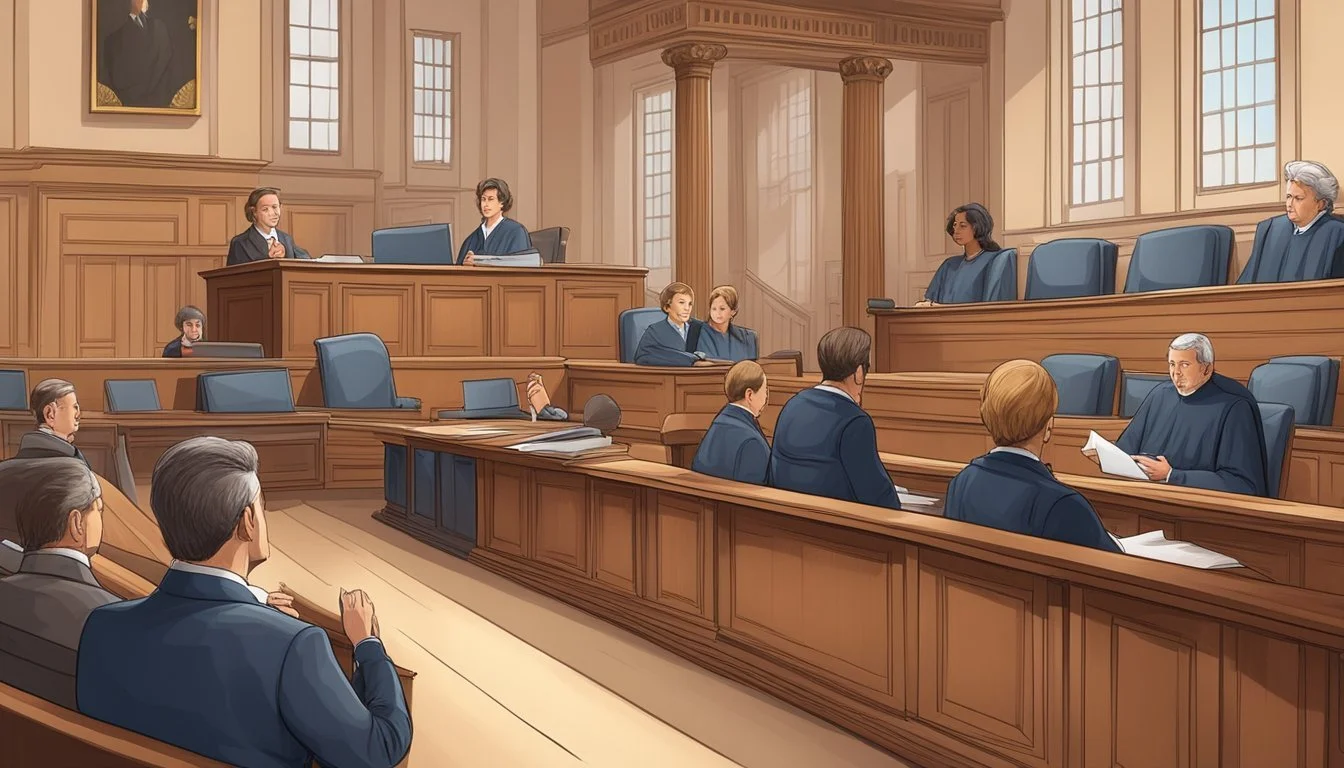The Act: The Disturbing True Story of Gypsy Rose and Dee Dee Blanchard
Unraveling a Shocking Case of Munchausen by Proxy
The Act, a Hulu miniseries, dramatizes the shocking true story of Gypsy Rose Blanchard and her mother Dee Dee. Their tale captivated the public with its blend of deception, abuse, and ultimately murder. Gypsy Rose spent years as a victim of her mother's Munchausen syndrome by proxy, enduring unnecessary medical procedures and medications for fabricated illnesses.
The series draws inspiration from real events, including the 2015 killing of Dee Dee Blanchard. Nicholas Godejohn, Gypsy's online boyfriend, carried out the act by stabbing Dee Dee 17 times as she slept. Prosecutors alleged that Gypsy orchestrated the murder to escape her mother's control.
This story has been the subject of multiple adaptations, including the documentary Mommy Dead and Dearest. The Act explores the complex relationship between Gypsy and Dee Dee, portraying years of medical abuse and manipulation that led to a tragic conclusion. It offers viewers a glimpse into the psychological impact of long-term deception and the desperate measures taken to break free from it.
Background and Profile
The Blanchard case revolves around a complex web of deception, abuse, and tragedy. At its center are Gypsy Rose Blanchard and her mother Dee Dee, whose troubled relationship led to shocking consequences.
Gypsy Rose: The Victim Behind the Act
Gypsy Rose Blanchard was born in 1991 to Rod Blanchard and Dee Dee. From an early age, she was portrayed as severely ill and disabled. Dee Dee claimed Gypsy suffered from leukemia, asthma, muscular dystrophy, and other conditions.
Gypsy was confined to a wheelchair despite being able to walk. She underwent numerous unnecessary medical procedures and took medications she didn't need. Her head was shaved, and she was made to appear younger than her actual age.
As Gypsy grew older, she began to suspect her mother's deception. She attempted to escape multiple times but was always brought back by Dee Dee. The isolation and abuse continued for years until Gypsy took drastic action.
Dee Dee Blanchard: A Troubling Figure
Dee Dee Blanchard, born Clauddine Pitre in 1967, exhibited signs of Munchausen Syndrome by Proxy. This mental disorder causes a caregiver to fabricate or induce illness in someone under their care.
Dee Dee convinced doctors, charity organizations, and even her own family that Gypsy was critically ill. She manipulated medical records and isolated Gypsy from others who might question her claims.
Her deception extended beyond Gypsy's health. Dee Dee falsified their ages, claimed they were Hurricane Katrina survivors, and accepted donations and gifts under false pretenses. Her actions went unchallenged for years due to her charming personality and apparent devotion to her daughter.
The Blanchard Family: Life Before the Crime
Before the fabricated illnesses began, the Blanchard family lived in Louisiana. Rod and Dee Dee separated shortly after Gypsy's birth, with Rod remaining involved in Gypsy's life from a distance.
Dee Dee's behavior raised concerns among some family members, but her control over Gypsy's narrative prevented serious intervention. After Hurricane Katrina in 2005, Dee Dee and Gypsy relocated to Missouri.
In their new home, they became known for their inspiring story of overcoming adversity. Charity organizations provided them with a specially-built house, trips to Disney World, and other benefits. This facade of a loving mother caring for her sick child hid the dark reality of abuse and control that would eventually lead to a shocking crime.
The Illness Charade
Dee Dee Blanchard fabricated numerous medical conditions for her daughter Gypsy Rose, subjecting her to unnecessary treatments and procedures for years. This complex web of deception involved multiple hospitals, doctors, and diagnoses.
Medical Deceptions and Misdiagnoses
Dee Dee claimed Gypsy suffered from leukemia, asthma, muscular dystrophy, and seizures. She also alleged Gypsy had vision and hearing impairments. None of these conditions were genuine.
Gypsy was fitted with a feeding tube despite being able to eat normally. Dee Dee insisted Gypsy use a wheelchair, though she could walk. A neurologist was even convinced of a non-existent chromosomal defect.
The list of false diagnoses grew over time, with each new claim adding to the illusion of Gypsy's frailty.
Role of Doctors and Hospital Visits
Medical professionals were repeatedly misled by Dee Dee's elaborate stories. Frequent hospital visits and consultations with specialists reinforced the facade of Gypsy's ill health.
Doctors prescribed medications and approved procedures based on Dee Dee's reports rather than observable symptoms. This included unnecessary surgeries and treatments that posed real risks to Gypsy's health.
The medical community's trust in Dee Dee's accounts allowed the deception to continue unchallenged for years.
Consequences of Prolonged Abuse
The ongoing medical abuse had severe physical and psychological impacts on Gypsy. Unnecessary medications and procedures caused actual health complications.
Gypsy's social and educational development was stunted by her isolation and perceived disabilities. She was denied normal childhood experiences and the opportunity to form genuine relationships.
The prolonged deception left Gypsy confused about her own health and capabilities. This distorted reality contributed to her eventual desperate actions to escape her mother's control.
Cracks in the Facade
As Gypsy Rose grew older, the carefully constructed reality created by her mother Dee Dee began to show signs of strain. Questions arose from both Gypsy herself and those around her, leading to increased scrutiny of their situation.
Gypsy Rose's Mental and Physical Awakening
Gypsy Rose started to question her supposed illnesses as she entered her teenage years. She realized her physical capabilities exceeded what her mother claimed. This awakening extended to her mental faculties, which were far more developed than Dee Dee portrayed.
Gypsy discovered she could walk without assistance and eat foods her mother had forbidden. She began to secretly explore the internet, learning about her true age and condition.
Suspicion and Inquiry from Outsiders
Neighbors and medical professionals began to notice discrepancies in Dee Dee's accounts of Gypsy's health. Gypsy's appearance and behavior often contradicted her mother's descriptions.
Some doctors questioned the numerous diagnoses and treatments. A neurologist found no evidence of muscular dystrophy, despite Dee Dee's insistence.
Local charity organizers also raised concerns about inconsistencies in the family's story.
The Role of Child Protective Services
Child Protective Services (CPS) received multiple reports about potential medical abuse in the Blanchard household. They conducted several investigations but found no conclusive evidence of wrongdoing.
CPS faced challenges due to Dee Dee's manipulative behavior and Gypsy's coached responses. The agency's interventions were limited by lack of concrete proof and Dee Dee's ability to present a convincing facade.
Despite these efforts, the full extent of the deception remained hidden for years.
The Escalation
Gypsy Rose Blanchard's life took a dark turn as she discovered the internet and formed an online relationship. This led to a dangerous plan that would change everything.
Discovering the Internet: Gypsy Rose's Outlet
Gypsy Rose found freedom through the internet, secretly accessing it when her mother was asleep. She created social media accounts and explored online communities. This digital world became her escape from the confines of her mother's control.
Gypsy joined chat rooms and forums, connecting with people who shared her interests in horror and sci-fi. She even attended a sci-fi convention, briefly tasting independence away from Dee Dee's watchful eye.
The internet allowed Gypsy to express herself and learn about the world beyond her sheltered existence. It opened her eyes to possibilities she had never imagined.
Nicholas Godejohn and the Online Bond
Gypsy met Nicholas Godejohn on a Christian dating site in 2012. Their relationship quickly intensified as they bonded over shared interests and desires.
Nicholas had a history of mental health issues and a fascination with BDSM. Gypsy, desperate for love and acceptance, was drawn to his attention and affection.
They communicated through secret Facebook accounts and video chats. Nicholas became Gypsy's confidant, learning about her mother's abuse and her desire for freedom.
Their online relationship grew increasingly intense. They discussed fantasy scenarios and role-playing, which later evolved into darker conversations about Dee Dee.
The Plan and Prelude to Murder
As Gypsy's frustration with her situation grew, she and Nicholas began discussing drastic measures. They formulated a plan to eliminate Dee Dee, seeing it as the only way for Gypsy to escape.
In March 2015, they staged a meeting at a movie theater. Gypsy dressed as Cinderella, while Nicholas wore a Prince Charming costume. This encounter, though brief, solidified their alliance.
The couple meticulously planned the murder. Gypsy provided Nicholas with details about her home's layout and her mother's sleeping habits. She even procured the murder weapon - a knife from her kitchen.
On June 10, 2015, Nicholas traveled to the Blanchard home. The plan was set in motion, leading to the brutal stabbing of Dee Dee Blanchard as she slept.
The Crime
The murder of Dee Dee Blanchard shocked Springfield, Missouri in 2015. This heinous act exposed years of abuse and deception, culminating in a daughter's desperate plan to escape her mother's control.
The Murder of Dee Dee Blanchard
On June 10, 2015, Dee Dee Blanchard was stabbed to death in her bed. The crime scene revealed a brutal attack, with 17 stab wounds inflicted on the sleeping woman. Nicholas Godejohn, Gypsy Rose Blanchard's online boyfriend, carried out the physical act of murder.
Gypsy Rose, long believed to be severely ill and disabled, had orchestrated the plan. She provided Godejohn with a knife and hid in the bathroom while he committed the crime. The pair then fled the scene, leaving Dee Dee's body undiscovered for several days.
Aftermath and Arrest
A cryptic Facebook post on Dee Dee's account raised alarm among friends and family. Concerned neighbors contacted the police, leading to the discovery of Dee Dee's body on June 14, 2015. Authorities initially feared Gypsy Rose had been kidnapped or harmed.
The investigation quickly took a surprising turn. Gypsy Rose was found alive in Wisconsin with Godejohn, walking and appearing healthier than ever before. Both were arrested and charged with first-degree murder.
Prosecutors later reduced Gypsy's charge to second-degree murder, considering the years of abuse she endured. She accepted a plea deal and received a 10-year sentence. Godejohn was convicted of first-degree murder and sentenced to life in prison.
The Media and Public Perception
The Gypsy Rose Blanchard case captivated audiences through various media portrayals, sparking widespread debate and analysis. True crime enthusiasts and casual viewers alike were drawn to the shocking story.
True Crime Fervor: Documentaries and Dramatizations
HBO's documentary "Mommy Dead and Dearest" brought the Blanchard case to national attention in 2017. It provided a detailed look into the complex relationship between Gypsy Rose and her mother Dee Dee.
Hulu's dramatized series "The Act" further popularized the story in 2019. Joey King portrayed Gypsy Rose, while Patricia Arquette took on the role of Dee Dee Blanchard. The series received critical acclaim and numerous award nominations.
Buzzfeed and other online platforms produced articles and videos about the case, reaching millions of viewers. These varied media formats allowed for different perspectives on the story to emerge.
Understanding the Phenomenon: Debates and Discussions
The Blanchard case prompted discussions about Munchausen syndrome by proxy and medical child abuse. Mental health professionals weighed in on the psychological aspects of the mother-daughter relationship.
Legal experts debated the ethics of Gypsy Rose's sentence. Some argued for leniency given her years of abuse, while others emphasized the severity of the crime.
Societal discussions arose about the role of social media in the case. Gypsy Rose's online presence and her relationship with Nicholas Godejohn became focal points of analysis.
The media coverage raised questions about sensationalism in true crime reporting. Critics argued that some portrayals romanticized or oversimplified the complex issues involved in the case.
Legal Proceedings and Sentencing
The legal aftermath of Dee Dee Blanchard's murder unfolded with intense public scrutiny. Gypsy Rose Blanchard and Nicholas Godejohn faced serious charges, leading to separate trials and divergent outcomes.
The Trial and Defense
Gypsy Rose Blanchard pleaded guilty to second-degree murder in July 2015. Her defense team highlighted the years of abuse she endured due to her mother's Munchausen syndrome by proxy. They argued that Gypsy Rose was a victim who saw no other way to escape her situation.
Nicholas Godejohn, Gypsy's boyfriend who carried out the stabbing, was tried separately. He faced a charge of first-degree murder. His defense attempted to portray him as a manipulated individual with limited mental capacity.
Gypsy Rose's Sentence and Public Reaction
In 2016, Gypsy Rose received a 10-year sentence for second-degree murder. The relatively lenient sentence reflected the court's consideration of her circumstances. Many viewed her as both perpetrator and victim.
Public reaction was mixed. Some sympathized with Gypsy Rose, seeing her actions as desperate self-defense. Others maintained that murder was unjustifiable, regardless of the circumstances.
Gypsy Rose became eligible for parole after serving 85% of her sentence. Her release in December 2023 reignited public interest in the case. Many debated the adequacy of her punishment given the complex nature of her victimization.
Cultural Impact and Legacy
The Gypsy Rose and Dee Dee Blanchard case captivated audiences worldwide, sparking intense discussions about medical abuse and the complexities of family dynamics. Their story inspired numerous media adaptations and left a lasting imprint on popular culture.
Influence on Popular Culture and Media
HBO's documentary "Mommy Dead and Dearest" brought widespread attention to the case in 2017. The film explored the shocking details of Dee Dee's deception and Gypsy's eventual role in her mother's death.
Hulu's dramatized series "The Act" further popularized the story, starring Patricia Arquette and Joey King. The show received critical acclaim and multiple award nominations, introducing the case to an even broader audience.
Books, podcasts, and news articles have also covered the Blanchard story extensively. These various media adaptations have contributed to ongoing public fascination with the case.
Legacy of Gypsy Rose and Dee Dee's Story
The Blanchard case raised awareness about Munchausen syndrome by proxy, a rare form of abuse where a caregiver fabricates or induces illness in someone under their care.
It sparked important conversations about medical ethics, the potential for healthcare system exploitation, and the long-term effects of psychological abuse on children.
The story continues to be referenced in discussions about complex family dynamics and the blurred lines between victim and perpetrator in extreme circumstances.
Gypsy Rose's experiences have also led to increased scrutiny of online relationships and their potential dangers, especially for vulnerable individuals.




